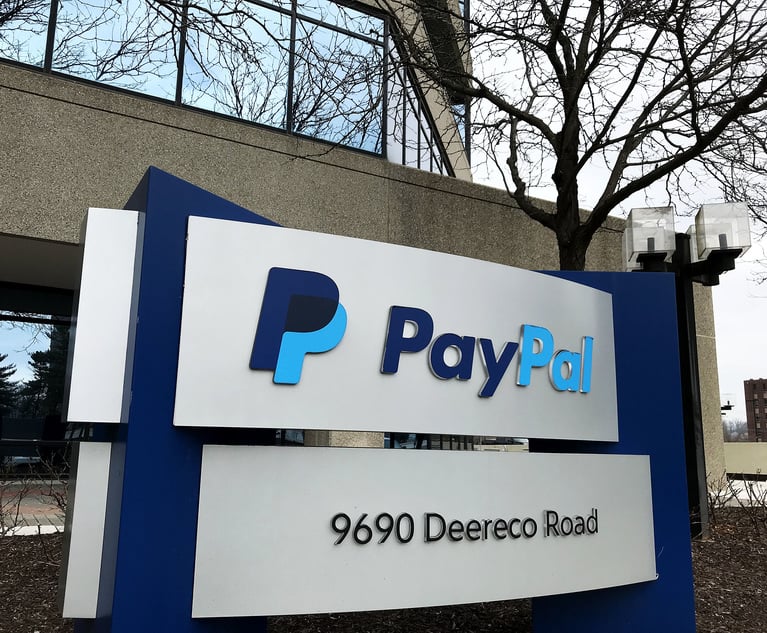Will a Court Ruling Extending SEC's Fraud Reach Push More ICOs Offshore?
A federal appellate court recently poured cold water on the idea that someone in the U.S. selling securities to investors outside the U.S. might evade the SEC's reach.
January 31, 2019 at 03:38 PM
4 minute read
The original version of this story was published on Law.com

While the Securities and Exchange Commission has taken a more active role in policing initial coin offerings over the last year, many in the ICO space have hoped courts would limit the reach of the federal securities laws.
However, courts have repeatedly dashed such hopes. On Jan. 24, a federal appellate court poured further cold water over the idea that someone in the U.S. selling securities to investors outside the U.S. might evade the SEC's reach.
The case, SEC v. Traffic Monsoon, did not involve an ICO, but it did involve an issue near and dear to the hearts of ICO issuers: When a non-exchange listed security is offered and sold over the internet, does the sale take place in the location of the seller or the location of the buyer?
And, perhaps more importantly, if most of the buyers of a security are located outside the U.S., do federal securities laws apply?
The SEC sued Monsoon in 2016, alleging fraud in connection with the Utah company's business, described as “a combination of an Internet traffic exchange, where users browse each others' websites, and a pay-per-click program, where users are paid to click on others' website banner ads.”
Monsoon argued that because 90% of investments were made to by individuals outside of the U.S. and the investments occurred over the internet, the federal securities laws did not apply and the SEC could not pursue the case.
In 2017, the federal trial court in Utah decided in the SEC's favor and against Monsoon, but Monsoon immediately appealed that decision.
Astute observers immediately recognized how the Monsoon case and the trial court's decision could be applied to ICOs — and critics identified weaknesses and shortcomings in the court's legal reasoning.
Indeed, while the Monsoon appeal was pending, the case was cited in other ICO-related cases such as the private litigation involving Tezos.
In denying a motion to dismiss the Tezos action in October, relying in part on the trial court's decision in Monsoon, the Court asked, “Where does [the sale of] an unregistered security, purchased on the internet, and recorded 'on the blockchain,' actually take place?”
The Tezos court's answer? In the U.S. The plaintiff investor in the Tezos case participated in the transaction by using an interactive website that was hosted on a server in Arizona and run in California, and his contribution of Ethereum to the ICO became irrevocable only after it was validated by a network of global “nodes” clustered more densely in the U.S. than any other country.
Then, on Jan. 24, the Monsoon appellate court reached a similar conclusion. The appellate court confirmed the trial court's ruling and found in the SEC's favor, recognizing the broad geographical reach of the federal securities laws in the context of securities sold over the internet to foreign investors.
Specifically, the court found that the SEC may bring fraud charges against someone selling securities to investors outside the U.S. when the investment was conceived, created and promoted over the internet from inside the U.S. and the servers housing the company's website were also in the U.S.
The impact of the Monsoon appellate decision on ICOs remains to be seen. Some ICO issuers might choose to challenge the basis of the ruling or find ways to distinguish the facts in Monsoon from their own circumstances. Other ICO issuers may just decide to move offshore.
— Check out Does Any Token Exist That Is Not a Security? on ThinkAdvisor.
 Nicolas Morgan is a partner at the global defense firm Paul Hastings. He focuses his practice on complex securities litigation in state and federal courts and representations involving government investigations and white-collar crime allegations levied against individuals and businesses. He routinely represents securities issuers, company officers and directors, investment funds, analysts and brokers in connection with SEC and FINRA investigations, litigation and arbitration.
Nicolas Morgan is a partner at the global defense firm Paul Hastings. He focuses his practice on complex securities litigation in state and federal courts and representations involving government investigations and white-collar crime allegations levied against individuals and businesses. He routinely represents securities issuers, company officers and directors, investment funds, analysts and brokers in connection with SEC and FINRA investigations, litigation and arbitration.
He also counsels public companies, funds and broker-dealers on securities compliance and corporate governance, conducts internal investigations and assists in regulatory examinations initiated by the SEC's Division of Corporate Finance and Office of Compliance Inspections and Examinations.
This content has been archived. It is available through our partners, LexisNexis® and Bloomberg Law.
To view this content, please continue to their sites.
Not a Lexis Subscriber?
Subscribe Now
Not a Bloomberg Law Subscriber?
Subscribe Now
NOT FOR REPRINT
© 2025 ALM Global, LLC, All Rights Reserved. Request academic re-use from www.copyright.com. All other uses, submit a request to [email protected]. For more information visit Asset & Logo Licensing.
You Might Like
View All
'Biggest Influencer Scam of All Time'?: PayPal Accused of Poaching Commissions Via Its 'Honey' Browser Extension



As AI-Generated Fraud Rises, Financial Companies Face a Long Cybersecurity Battle
Trending Stories
- 1Attorneys ‘On the ‘Move: Morrison Cohen Expands White Collar Practice; O’Melveny Brings Back Corporate Finance Partner
- 2SEC Puts Beat Down on Ex-Wrestling CEO Vince McMahon for Not Reporting Settlements
- 3Discovery Seeks to Link Yale University to Doctor in Fertility Scandal
- 4On The Move: Energy Infrastructure Pro Joins Moore & Van Allen, Adams & Reese Changes Atlanta Leadership
- 5Miami Attorneys Secure $4M Settlement Despite Insurance Limits
Who Got The Work
Michael G. Bongiorno, Andrew Scott Dulberg and Elizabeth E. Driscoll from Wilmer Cutler Pickering Hale and Dorr have stepped in to represent Symbotic Inc., an A.I.-enabled technology platform that focuses on increasing supply chain efficiency, and other defendants in a pending shareholder derivative lawsuit. The case, filed Oct. 2 in Massachusetts District Court by the Brown Law Firm on behalf of Stephen Austen, accuses certain officers and directors of misleading investors in regard to Symbotic's potential for margin growth by failing to disclose that the company was not equipped to timely deploy its systems or manage expenses through project delays. The case, assigned to U.S. District Judge Nathaniel M. Gorton, is 1:24-cv-12522, Austen v. Cohen et al.
Who Got The Work
Edmund Polubinski and Marie Killmond of Davis Polk & Wardwell have entered appearances for data platform software development company MongoDB and other defendants in a pending shareholder derivative lawsuit. The action, filed Oct. 7 in New York Southern District Court by the Brown Law Firm, accuses the company's directors and/or officers of falsely expressing confidence in the company’s restructuring of its sales incentive plan and downplaying the severity of decreases in its upfront commitments. The case is 1:24-cv-07594, Roy v. Ittycheria et al.
Who Got The Work
Amy O. Bruchs and Kurt F. Ellison of Michael Best & Friedrich have entered appearances for Epic Systems Corp. in a pending employment discrimination lawsuit. The suit was filed Sept. 7 in Wisconsin Western District Court by Levine Eisberner LLC and Siri & Glimstad on behalf of a project manager who claims that he was wrongfully terminated after applying for a religious exemption to the defendant's COVID-19 vaccine mandate. The case, assigned to U.S. Magistrate Judge Anita Marie Boor, is 3:24-cv-00630, Secker, Nathan v. Epic Systems Corporation.
Who Got The Work
David X. Sullivan, Thomas J. Finn and Gregory A. Hall from McCarter & English have entered appearances for Sunrun Installation Services in a pending civil rights lawsuit. The complaint was filed Sept. 4 in Connecticut District Court by attorney Robert M. Berke on behalf of former employee George Edward Steins, who was arrested and charged with employing an unregistered home improvement salesperson. The complaint alleges that had Sunrun informed the Connecticut Department of Consumer Protection that the plaintiff's employment had ended in 2017 and that he no longer held Sunrun's home improvement contractor license, he would not have been hit with charges, which were dismissed in May 2024. The case, assigned to U.S. District Judge Jeffrey A. Meyer, is 3:24-cv-01423, Steins v. Sunrun, Inc. et al.
Who Got The Work
Greenberg Traurig shareholder Joshua L. Raskin has entered an appearance for boohoo.com UK Ltd. in a pending patent infringement lawsuit. The suit, filed Sept. 3 in Texas Eastern District Court by Rozier Hardt McDonough on behalf of Alto Dynamics, asserts five patents related to an online shopping platform. The case, assigned to U.S. District Judge Rodney Gilstrap, is 2:24-cv-00719, Alto Dynamics, LLC v. boohoo.com UK Limited.
Featured Firms
Law Offices of Gary Martin Hays & Associates, P.C.
(470) 294-1674
Law Offices of Mark E. Salomone
(857) 444-6468
Smith & Hassler
(713) 739-1250






